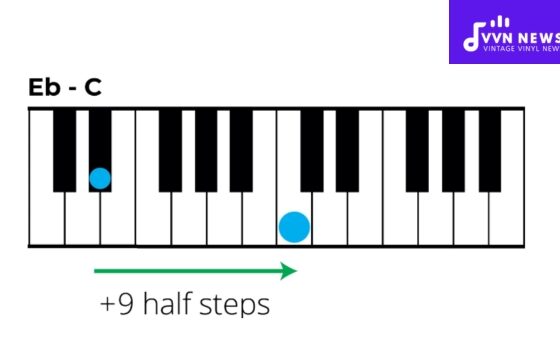The need for informed and innovative minds grows with the music industry consistently evolving.
Earning a music business degree is crucial to this lucrative and dynamic field.
This holistic education provides an in-depth understanding of music and teaches vital business strategies and nuances integral to succeeding within this diverse industry.
Regarded as one of the most creative domains, the music industry calls for professionals who understand the rhythm of art and commerce.
Possessing a robust knowledge of legal issues, royalty norms, marketing techniques, public relations, and music – these elements combine powerfully within a music business degree.
It’s like learning to play a symphony where each note resonates with factors that shape the vibrant music world.
What is a Music Business Degree?
A music business degree is an academic program that focuses on the business aspects of the music industry.
It is designed to give students a solid understanding of the music business, including artist management, record labels, music publishing, concert promotion, and music marketing.
The curriculum typically covers artist development, copyright law, contracts, music distribution, music licensing, and revenue streams in the music industry.
Graduates of a music business degree program can pursue various career paths in the music industry, including artist management, music publishing, record label operations, concert and event promotion, and music marketing and public relations.
Also Read: What Does An Audio Engineer Do? 2025 [How To Become One?]
Types of Music Business Careers

With its diverse roles and responsibilities, the music industry offers numerous opportunities for individuals equipped with a Music Business Degree.
One can take numerous paths, each offering its unique blend of challenges and rewards.
Music Publisher
As a Music Publisher, you play a critical role in safeguarding the interests of songwriters and composers.
This career involves securing song copyrights, promoting them to recording artists, film and television, managing royalties, and negotiating licensing deals.
A keen understanding of the music market and networking savvy are must-have skills to succeed in this role.
Music Marketer
Music Marketers create and execute campaign strategies to promote music and artists.
You’ll be in charge of social media accounts, streaming promotions, press coverage arrangements, and tour announcements—all with the primary goal of increasing an artist’s online and offline presence.
Creative flair combined with substantial digital marketing knowledge constitutes the cornerstone of this career.
Concert Promoter
Bringing life into envisioned musical events is what a Concert Promoter does best.
They organize concerts, schedule performers, negotiate contracts, and manage advertisement campaigns – all while ensuring the event is profitable. Organizational skills coupled with a flair for negotiation are vital here.
Producer & Supervisor
The ability to marry musical elements with commercial appeal defines a Music Producer and supervisor’s job profile.
They supervise recording sessions, guide musicians & engineers through the production process, and often have an active role in composing music, too! Musical expertise and leadership go hand-in-hand for success in this role.
Booking Agent
A Booking Agent’s job is to get gigs for musicians they represent – concerts, tours, or interviews on late-night TV shows!
An extensive network within the industry combined with strong negotiation skills defines their influence – financially and artistically for those they represent.
Music or Instrument Distributor
Whether digital distribution or physical logistics of musical instruments – Distributors act as intermediaries between manufacturers/artists and the market.
Part salesperson and part logistics officer – the success of a Distributor lies in their market understanding and relationship-management skills.
Artist Manager
The right-hand person to an artist, an Artist Manager, handles their day-to-day affairs, coordinates with agents/promoters, and often contributes to strategic decisions towards the artist’s career development.
Trust-building and apt managerial skills form the spine of this all-important career role.
Tour Manager
Imagine serving as the captain of a touring ship – that’s what being a Tour Manager feels like!
They oversee every touring aspect- from travel logistics and budget allocations to backstage duties during events.
Strong leadership combined with problem-solving abilities makes for a great Tour Manager.
Public Relations
As a Public Relations professional in music, image management is your key responsibility – crafting press releases, managing media relations, and crisis control if necessary.
It’s a position that calls for exceptional communication skills and an innate understanding of public perception nuances.
Copyright Administrator
A Copyright Administrator ensures that artists get their dues for their creative work – administrating copyright registrations and overseeing licensing agreements while being the point of contact for copyright queries.
Understanding Intellectual Property Law alongside sharp administrative capabilities can make you excel in this role.
Careers in Music Business are as diverse as they are fascinating! Creative skills meet commercial acumen in each role – blending harmony with business strategy to create unique opportunities in one of today’s most dynamic industries.
Also Read: Types Of Music Majors, Careers, Degrees, & Programs In 2025
Benefits of a Music Business Degree
There are several distinct advantages to pursuing a Music Business Degree. Let’s take a closer look at what makes this degree so rewarding:
Comprehensive Skill Development
A Music Business Degree is not just about music but also about developing essential soft and hard skills.
You’ll learn everything from music theory and history powered with business principles like finance, marketing, and administration.
Strong Industry Connections
Universities offering this degree usually have long-standing relationships with music industry professionals, often leading to networking opportunities.
The guest lectures, industry visits, internships, or mentorship programs may provide the experience and connections needed to break into the industry.
Increased Employability
With a Music Business Degree, your job prospects expand beyond traditional routes.
In addition to jobs like composer or performer, you can explore opportunities in publishing, marketing, sales, production – you name it!
A Direct Path to Entrepreneurship

Finally, if you’ve ever dreamed of starting your record label or becoming an artist manager, a Music Business Degree equips you with the necessary entrepreneurial skills.
A Platform for Growth
Alongside this broad spectrum of knowledge and networking potential comes personal growth.
A Music Business Degree cultivates your creative problem-solving skills, ideal for navigating the dynamic terrain of modern music commerce.
In-Demand Skills Development
Music Business Degree not only endows technical know-how but also raises emotional intelligence and analytical skills.
It enables you to foresee market trends, design marketing campaigns, analyze financial statements, and handle legal issues concerning the music industry.
Also, it develops a keen sense for spotting talent – a precious skill in this celebrity-fueled commercial space.
So whether you dream of managing the next Grammy winner’s career or bringing the magnum opus of an underrated band to the world — a Music Business Degree equips you with what it takes to help you leave your mark on the music industry.
All in all, pursuing a Music Business Degree is a sound decision (no pun intended).
It prepares you for every fast-paced beat of this challenging and exciting industry.
From spotting talent to acing negotiations — it’s like learning to play every instrument that orchestrates success in the musical world of music commerce.
Also Read: Music Business Jobs In 2025 [Education, Skills & Salaries]
Skills for Pursuing a Music Business Degree

Specific skills would undoubtedly increase your chances of success in this complex, multidimensional domain when pursuing a Music Business Degree.
Here’s a list of fundamental abilities:
Musical Aptitude
Regardless of your role in the music industry, a genuine passion and appreciation for music is essential. This no-compromise attribute resonates throughout your interactions and decision-making processes, giving you an extra edge.
Basic Business Skills
Just as notes make up a song, financial planning and marketing strategies form the foundation of any successful business venture within the music industry.
Communication Skills
Effective communication can lead to creative collaborations, negotiation of contracts, or even settling disputes amicably. It’s also about connecting with diverse personalities that populate this field: artists, managers, promoters, and fans.
Knowledge of Intellectual Property Rights
This translates into understanding copyright laws, patents, and trademarks, vital in protecting artistic work and receiving deserved recognition or monetary compensation.
Having delineated these necessary skills, let’s delve deeper into two significant ones: musical aptitude and communication, exploring why they hold tremendous sway in shaping your journey toward acquiring that coveted Music Business Degree.
How to get a Music Business Degree?
Earning a Music Business Degree dismisses the notion that you must be a musician to thrive in the music industry.
However, a love for music and understanding its impact on culture and society is crucial. Here’s how you can step onto the path of earning this comprehensive degree:
High School Preparation
It all begins with high school preparation. Though not obligatory, having experience in music, both theory and practice, can give you an advantage.
Plus, inclinations towards business studies, economics, and mathematics can also be beneficial.
Choosing the Right University and Program
The next step is choosing an appropriate university. Research universities that offer robust Music Business programs.
Check alumni records, faculty profiles, and course curricula, among other things. Visit websites like Peterson’s or College Board to help narrow your search based on your requirements.
Application Process
Once your preferred institutions are lined up, begin the application process. This usually requires high school transcripts or GED scores. A letter of recommendation or personal statement emphasizing your commitment to music may enhance your application.
Academic Journey

Upon admittance into a program, your academic journey begins. Be prepared to delve into courses related to law (intellectual property rights), management (artist management or concert operations), marketing (digital marketing), and finance (budgeting in music projects), among others.
Internships and Field Experience
Most programs offer internship experiences. Use these opportunities for networking and gaining practical knowledge about different facets of the industry.
Bear in mind that dedication is critical throughout this journey.
Balancing understanding Mozart’s classics to mastering strategies behind Jay-Z’s branding is like walking a tightrope, but come graduation, you’d have learned to walk and dance on it.
Also Read: The Best Music Business Schools & Colleges In 2025
Top Universities for a Music Business Degree
The road to a rewarding career in the music business often starts with the proper educational foundation.
Here, we’ve compiled some of the nation’s top institutions renowned for their Music Business Degree programs:
Berklee College of Music

Situated in Boston, Massachusetts, the Berklee College of Music can be considered the epitome of a high-quality music business education.
The college offers a Bachelor of Music in Music Business/Management that grooms students for entrepreneurial success within the rapidly shifting music industry.
Their curriculum integrates traditional and new models and emphasizes strategic thinking, decision-making, negotiation skills, and ethical behavior.
Berklee also boasts a worldwide network of alumni who are leaders in their field, providing an immediate advantage to students navigating the competitive terrains of the global music industry.
Southern New Hampshire University
Moving towards Manchester, New Hampshire resides the reputable Southern New Hampshire University.
Their online Bachelor’s Degree in Music Business provides foundational business courses alongside specialized music industry studies.
This perfect blend allows students to hone their musical understanding while gaining substantial business exposure.
This flexible degree option empowers students across geographical barriers to realize their ‘music + business’ dreams.
University of Southern California – Thornton School of Music

Next up is The University of Southern California’s Thornton School Of Music, which offers one-of-a-kind programs that highlight innovation within artistic tradition.
Enrolled students obtain an overview regarding rights acquisitions from songwriters, publishers, and master owners, allowing them to navigate deals involving concert promoters, merchandisers, and more.
With its location at the heartland of global entertainment – Los Angeles itself – USC provides plentiful opportunities for networking and internships within renowned organizations.
New York University
New York University (NYU), with its Steinhardt School Of Culture’s Music Business Program, is recognized worldwide for serving as a leading academic facility ideal for producing future industry leaders.
Offering Bachelor’s and Master’s level programs, the students benefit hugely from fieldwork placements in music-related organizations that allow practical exposure alongside theoretical knowledge.
Belmont University

Located in Nashville – dubbed ‘Music City,’ Belmont University can’t be ignored regarding Music Business Degree.
Combining rigorous academic study with real-world industry experiences right in the heart of a city synonymous with music is too alluring to miss.
The Mike Curb College of Entertainment & Music Business at Belmont offers majors in Music Business, Audio Engineering Technology, and Entertainment Industry Studies.
Choosing the right university is often the first tune in composing your symphony within the music world. These are merely some suggestions to guide your research.
Always look for a program structure best fitting your aspirations within this vibrant industry.
Networking and Growth in Music Business
The music industry thrives on connections. When you have a foothold in the network, it is easier to learn about new opportunities, collaborate with like-minded professionals, and even find mentors who can guide you through the ebbs and flows of this dynamic field.
Networking ideas include:
- Music Events: Attending music awards, concerts, launches, and festivals. It gives numerous opportunities to meet industry biggies and aspirants alike. Make sure you leave a favorable impression!
- Online Platforms: Connect with professionals via LinkedIn or other professional networking websites and introduce yourself to people whose work you admire.
- Internships: They provide invaluable on-ground experience and a chance to make connections inside the industry. Music Business Networking is a valuable resource where upcoming professionals can interact globally, share experiences, and promote their efforts.
The potential for growth in the music business depends on diverse factors – your skillset, network strength, industry trends, and sheer persistence.
Constantly upgrading your knowledge base is the key to staying relevant in this progressive domain.
Also, pay keen attention to emerging technologies transforming how music is produced and consumed globally. Stay ahead of the curve!
Also Read: Top 25 Audio Engineering Schools And Colleges In 2025
FAQs About Music Business Degree
Can I major in Music Business if I am not a musician?
You don’t necessarily need to be a musician. However, having a sound understanding of music can be an advantage.
What topics are covered in a Music Business Degree program?
You’ll study entertainment law, artist management, marketing strategies, and concert promotion in such a program.
What jobs can I get with a Music Business Degree?
With a degree in Music Business, you can work as a concert promoter, producer & supervisor, booking agent, or music marketer.
Is the music business industry competitive?
Yes, the music business industry is highly competitive. But with the right skills and network, you can obtain promising opportunities.
Will studying for a Music Business Degree help me understand copyrights?
Certainly! Much of this degree educates students about the often complex world of copyright laws and royalties.
Conclusion
Embarking on a journey towards a Music Business Degree opens doors to an industry that thrives on innovation and creativity.
It enables graduates to have in-depth knowledge of the music and the intricate workings that bind the industry.
From contracts and copyrights to the promotion of emerging artists, your investment in this degree can lead you onto diverse career paths, potentially transforming your passion for music into a fulfilling vocation.








